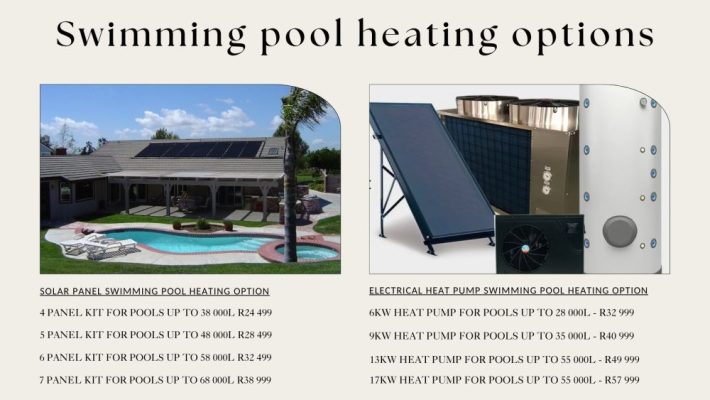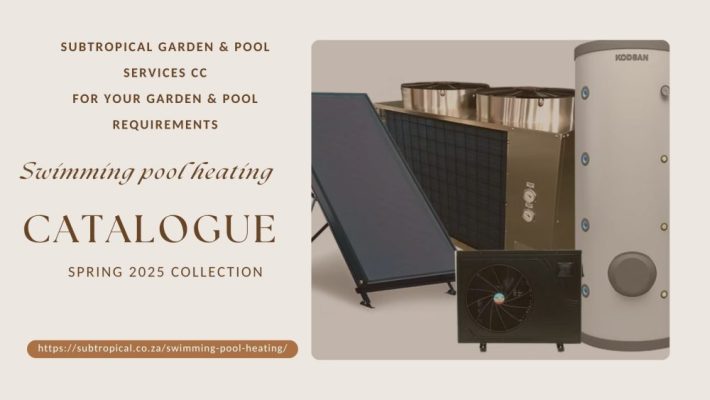
Heat Pump or Solar Panel Pool Heating
Heat Pump Pool Heating Explained
1. What is a heat pump?
A heat pump is a highly efficient heating system that works much like an air-conditioner in reverse. It extracts heat energy from the surrounding air and transfers it into your pool water, increasing the water temperature and extending your swimming season.
2. How does a heat pump work?
The unit absorbs heat from the outdoor air and transfers it through a heat exchanger. Pool water is circulated through the heat pump, warmed, and returned to the swimming pool. A built-in thermostat automatically maintains your chosen temperature.
3. What size heat pump do I need?
The correct size depends on:
-
Pool surface area
-
Pool water volume
-
Desired water temperature
-
Ambient climate conditions
We assess your pool and recommend the right unit to ensure fast, efficient heating.
4. Where is the heat pump installed?
Heat pumps are installed outdoors near your pool pump and filtration system. They do not require covering and should not be enclosed — proper airflow is essential for performance.
5. How complex is installation?
Installation is straightforward. Requirements include:
-
A dedicated 220-volt electrical circuit
-
Connection to your existing pool pump system
-
Adequate space for airflow
-
A level surface (existing concrete slab or new one if needed)
If your pool uses a chlorinator, it must be placed downstream with a check valve to prevent chemical damage.
6. What are the running costs?
Heat pumps are one of the most economical pool-heating options, using:
-
Free heat from the air, and
-
Low electrical consumption to run the compressor
Solar heating is the only lower-cost option — but it heats only when sunlight is available.
7. Is maintenance required?
Maintenance is minimal. Simply:
-
Keep the unit free of leaves/debris
-
Maintain balanced pool water chemistry
-
If near the coast, rinse the evaporator coils occasionally to prevent salt build-up
8. Can a heat pump heat the pool overnight?
Yes — depending on pool size and outdoor temperature. Once your pool reaches your desired temperature, the heat pump will maintain it consistently throughout the season.
9. What are kW and BTU?
-
kW = kilowatt, a measure of electrical power
-
BTU = British Thermal Unit, a measure of heating output
(1 kW = 3,412 BTU)
10. What does COP mean?
COP (Coefficient of Performance) indicates energy efficiency — the ratio of heat output to electricity consumed. A higher COP means lower running costs and better efficiency.
11. Why use a solar blanket/pool cover?
A pool cover significantly reduces heat loss and evaporation — the biggest cause of heat loss. A quality cover can reduce heat loss by 50% to 95%, helping maintain temperature and reduce energy costs.
12. Will the heat pump run continuously?
No. Once you set the desired temperature, the thermostat monitors the water temperature and activates the unit only when needed.
13. How is the heat pump controlled?
Through a programmable digital control panel with a thermostat and temperature display.
14. Minimum operating temperature
AQUA-HEAT heat pumps feature a de-ice system and can continue heating efficiently at temperatures near 0°C, suitable for winter conditions.
15. Will the heat pump ever need more refrigerant?
The refrigeration system is factory-sealed. The refrigerant (Freon) should last for the life of the unit. Only in rare cases, such as physical damage causing a leak, would a recharge be required.
✅ Interested in Pool Heating?
📞 Get a Free Quotation
📞 Call: 083-560-1555
📩 Request a quotation online
🌿 Local, trusted outdoor services since 1995
If you’d like a quotation on heat pumps or solar pool heating, simply complete our Request My Quotation form and our team will contact you with pricing and tailored recommendations.


Solar Panel Swimming Pool Heating Explained
Why Choose Solar Pool Heating?
Solar pool heating is the most widely used solar application in the world — and for good reason. Thousands of homeowners in Gauteng enjoy the comfort and cost-saving benefits of warmer pool water powered by the sun.
A solar pool-heating system can save up to 50% compared to a heat pump in upfront cost and has no ongoing running costs. It is safe, quiet, reliable, and built to last.
No electricity. No gas. No emissions. Just free solar energy.
Advantages of Solar Pool Heating
Solar pool-heating systems are exceptionally durable and avoid common heating system failures such as:
-
✔ No corrosion
-
✔ No motors to fail
-
✔ No compressors
-
✔ No gas leaks or flames
-
✔ No noise
-
✔ Eco-friendly, renewable energy
How Well Will Solar Heat My Pool?
When sized correctly and installed with good sun exposure, a solar pool-heating system can warm your pool 6°C to 12°C above its normal temperature, depending on weather conditions.
The heating performance depends on:
-
Amount of collector area vs pool surface area
-
Amount of direct sun
-
Pool size and location
The greater the solar collector area, the higher (and more consistent) the temperature will be.
Maintenance Requirements
Solar heating has no special maintenance requirements.
Just keep your filtration system operating normally — no servicing contracts, no machinery to inspect, and no parts to replace.
Solar Pool Cover — Do You Need One?
While optional, a solar pool cover is recommended during colder nights and early/late swimming seasons.
Benefits:
-
Reduces evaporation (the largest heat loss factor)
-
Keeps heat in the water overnight and in bad weather
-
Helps maintain warmer temperatures for longer
Covers float on the pool surface and have air pockets for insulation. They block some sunlight, but the heat-retention benefits outweigh this.
Key Benefits of Solar Pool Heating
-
✅ Uses free solar energy
-
✅ No fuel, no electricity, no emissions
-
✅ Low-maintenance and long-lasting
-
✅ Extends your swim season to 6–8 months per year
-
✅ Increases property value
-
✅ Quick payback period
-
✅ More enjoyable swimming temperature for family, fitness, and relaxation
How Solar Pool Heating Works (Simple Explanation)
Your existing pool pump circulates water through the solar panels. As water flows through the panel tubing, it absorbs heat from the sun and returns warm water to the pool.
When the pool reaches your desired temperature, water is automatically bypassed around the panels.
No moving parts — just warm, natural solar-heated water.
Do Solar Panels Need to Face North?
North-facing is ideal in South Africa, but not essential. Panels can perform very well when mounted:
-
North (best)
-
East or West (effective with correct sizing)
-
On flat roofs (with support frames if required)
We design systems to maximise sun exposure on your property.
Will Solar Heating Damage My Roof?
No. We use proper roof-mounting hardware suitable for your roof type, ensuring no leaks or structural damage.
Operating Costs
Zero operating cost.
After installation, heating your pool is completely free using sunlight.
Solar vs Heat Pump — At a Glance
| Feature | Solar Heating | Heat Pump |
|---|---|---|
| Running Costs | Free | Low (electricity) |
| Upfront Cost | Lower | Higher |
| Maintenance | Minimal | Requires servicing |
| Performance | Best in sunny months | Reliable year-round |
| Eco-Friendly | ✅ 100% solar | ✅ Efficient, but uses electricity |
Both systems are excellent — solar for lowest lifetime cost, heat pumps for all-weather heating.
Ready for Warmer Water?
📞 Get a Free Quotation
📞 Call: 083-560-1555
📩 Request a quotation online
🌿 Local, trusted outdoor services since 1995
Enjoy more swimming months and the comfort of a warm pool.
Complete our Request My Quotation form and our team will assist you with pricing and installation options tailored to your pool.
